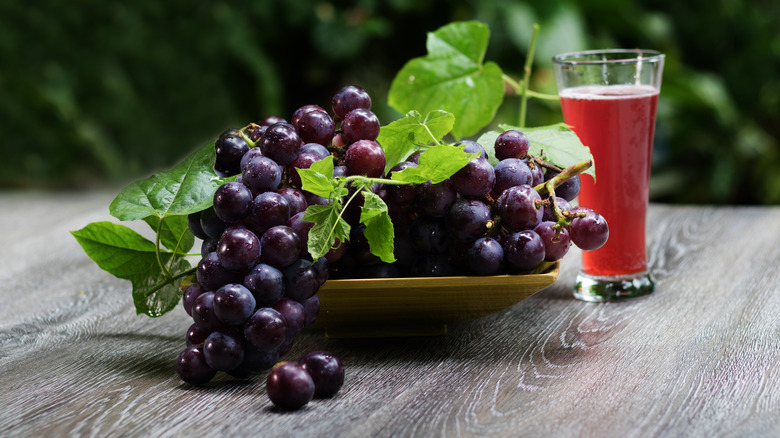Does Grape Juice Have The Same Benefits As Red Wine?
The news that drinking red wine may actually be good for you spread joy through communities of wine enthusiasts everywhere (via Daily Mail). It was the bright spot among the slew of dietary advice that proclaimed most of our favorite sugar- and fat-laden indulgences as not so great for our health. But now that we can enjoy red wine knowing that we might be doing our hearts and overall health a favor, it begs the question — can grape juice provide the same benefits, without the alcohol?
The answer is not entirely clear cut. Sure, wine and grape juice are both made from grapes, which are rich in heart-healthy and cancer-fighting antioxidants like flavonoids and resveratrol (via Mayo Clinic). Most of these antioxidants are found in the skins, stems, seeds, and leaves of the plants. These potent compounds have been linked to a host of health benefits, including lowering blood pressure and blood sugar levels, and lowering the risk of heart disease, blood clots, and cancer (via Healthline). When it comes to both red wine and grape juice though, the amount of antioxidants can vary widely depending on the type of grapes used, the location where they were grown, and the way they were processed.
Red wine may have the nutritional edge
One of the reasons that red wine may have an advantage over grape juice is that the skin of the grape — which contains these helpful antioxidants — is more likely to be used in wine than in juice (via Atlanta-Journal Constitution). Even in wine, though, the amount of antioxidants is variable and unpredictable. In general, dark grapes, like red and purple varieties, contain more antioxidants than white or green grapes, and that carries over into the wines and grape juices that come from them. But as Leonard Guarente, who studies the biology of aging at MIT, told the Atlanta-Journal Constitution, "There's a tremendous variability in the amount of resveratrol even from one wine type and one batch to another."
Grape juice and red wine each have some other unique health benefits that are all their own. Grape juice contains plenty of vitamin C — enough that one cup of juice provides all the vitamin C you need for the day — as well as vitamin K, potassium, and trace minerals (via LiveStrong). The fermentation process of red wine, on the other hand, unlocks the additional benefit of tannins, which also act as antioxidants (via University of Missouri Extension). While both red wine and grape juice offer health perks, it appears that red wine may have the nutritional edge. Susan Mills-Gray, Nutrition & Health Education Specialist with MU Extension explains, "You get similar benefits, but red wine would provide those health benefits at a bit higher level."


